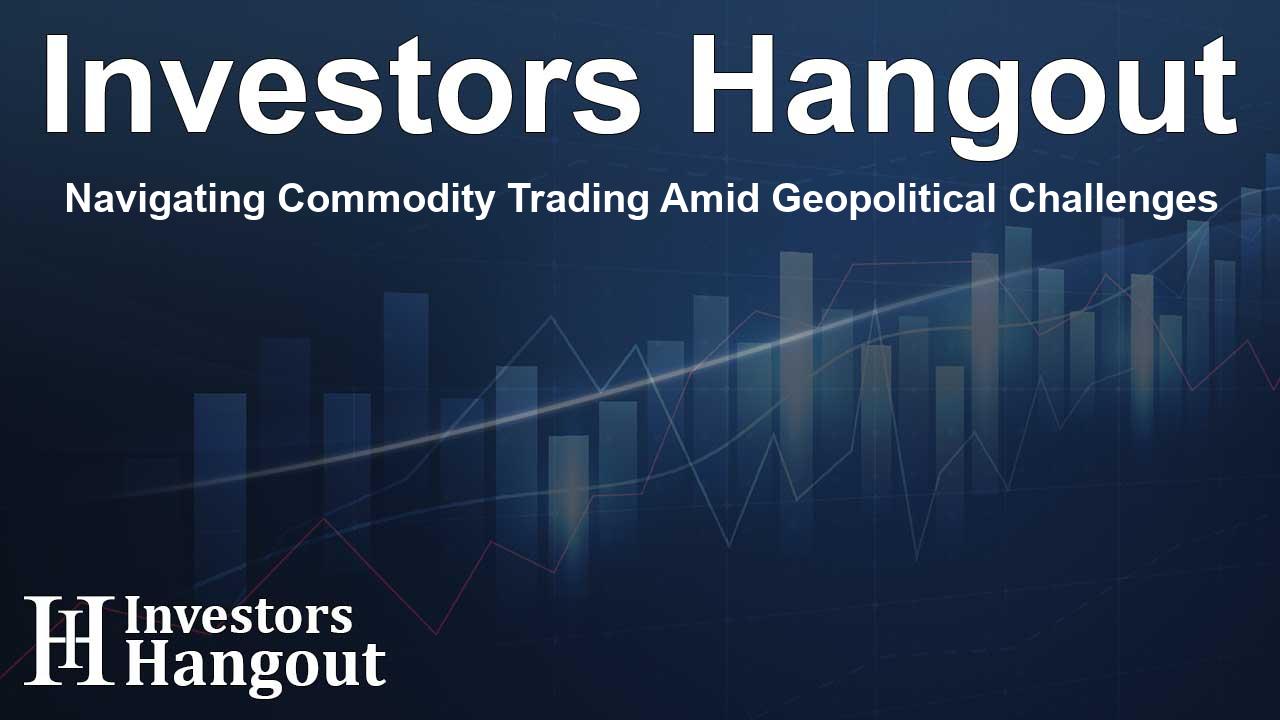Navigating Commodity Trading Amid Geopolitical Challenges

Understanding Geopolitical Risks in Commodity Trading
Commodity trading is currently navigating higher levels of geopolitical risks. Recent developments suggest a tumultuous path influenced by military conflicts, rising tariffs, and strained global supply chains. These elements contribute to a complex environment that can lead, surprisingly, to opportunities for profit in some sectors. This evolving landscape is highlighted in a report by Willis, a WTW business (NASDAQ: WTW), which reveals critical insights for traders aiming to adapt to the changes.
The Impact of Tariffs on Trade Flows
One of the most significant challenges identified in the report is tariffs, which have emerged as a predominant threat redefining trade dynamics. Tariffs inject uncertainty into decision-making processes among traders. The landscape is shifting, making commodity flow less predictable and restructuring how international trade is conducted.
China's Role in Global Commodities
China remains the largest player in many commodity markets, making its economic stability a top priority for traders. As growth slows and inflation risks linger, the repercussions of tariff pressures threaten to ripple through global supply chains. For traders, close monitoring of China's economic health is essential for strategic planning and risk mitigation.
Climate Change and Its Effects
Beyond economics, climate change is dramatically reshaping commodity trading. Seasonal changes are altering fuel demand, while increased pesticide use and logistical challenges are becoming commonplace due to environmental shifts. Traders need to anticipate these changes to maintain efficiency and profitability.
Military Conflicts and Market Disruptions
The ongoing tensions stemming from military actions, particularly in Ukraine, influence the global commodity market significantly. The threat of Black Sea trade disruptions, alongside Russian military strategies, raises alarms about potential supply shocks that can impact pricing and availability. Such geopolitical disturbances necessitate immediate response strategies from commodity traders.
Emerging Risks in Maritime Trade
Maritime routes are facing unprecedented challenges, with security becoming a considerable concern. The potential for drone attacks and other forms of disruptive tactics are posing risks to the shipping lanes, making the logistics of trade more complicated. Increased costs and potential rerouting of vessels need to be factored into trading strategies.
Future Regulations and Market Stability
As the market evolves, certain regulatory developments may emerge as critical concerns. For instance, increasing European sustainability regulations could reshape trading dynamics once more. Furthermore, a sudden downturn in the global bond market could pose a significant risk, with the potential for broader implications becoming evident as economic policies shift in response to post-pandemic conditions.
Strategizing for Success in Uncertain Times
Evan Freely, the global head of Willis credit risk solutions, underscores the importance of adapting to the current protectionist climate. There’s a pressing need for effective risk management strategies to maintain stability in commodity supply chains, especially as reliance on imports continues.
Impact of Inflation and Supply Chain Solutions
With inflation rising sharply, solutions to manage risks across trading operations will be critical. Proactive management of these risks can prevent shortages and maintain operational effectiveness. The learnings from the report serve as a vital resource for stakeholders actively engaged in this sector.
Frequently Asked Questions
What are the main risks facing commodity traders today?
Commodity traders today face heightened tariffs, economic uncertainty in China, climate change impacts, geopolitical tensions especially in Ukraine, and disruptions in maritime trade.
How do tariffs affect commodity trading?
Tariffs create uncertainties in decision-making and alter traditional trade flows, leading traders to reassess strategies and adapt to new challenges.
What role does China play in the commodity market?
China is the largest buyer in many commodity sectors, making its economic performance essential for traders. Any slowdowns can significantly impact commodities' overall balance and profitability.
Why is climate change a concern for commodity traders?
Climate change affects demand and logistics in commodity markets, driving changes in seasonal fuel requirements and increasing the complexity of trading operations.
What are some emerging risks identified in the report?
Emerging risks include changes in European sustainability regulations and potential shocks in the global bond markets, which could impact trading dynamics significantly.
About The Author
Contact Dominic Sanders privately here. Or send an email with ATTN: Dominic Sanders as the subject to contact@investorshangout.com.
About Investors Hangout
Investors Hangout is a leading online stock forum for financial discussion and learning, offering a wide range of free tools and resources. It draws in traders of all levels, who exchange market knowledge, investigate trading tactics, and keep an eye on industry developments in real time. Featuring financial articles, stock message boards, quotes, charts, company profiles, and live news updates. Through cooperative learning and a wealth of informational resources, it helps users from novices creating their first portfolios to experts honing their techniques. Join Investors Hangout today: https://investorshangout.com/
The content of this article is based on factual, publicly available information and does not represent legal, financial, or investment advice. Investors Hangout does not offer financial advice, and the author is not a licensed financial advisor. Consult a qualified advisor before making any financial or investment decisions based on this article. This article should not be considered advice to purchase, sell, or hold any securities or other investments. If any of the material provided here is inaccurate, please contact us for corrections.
